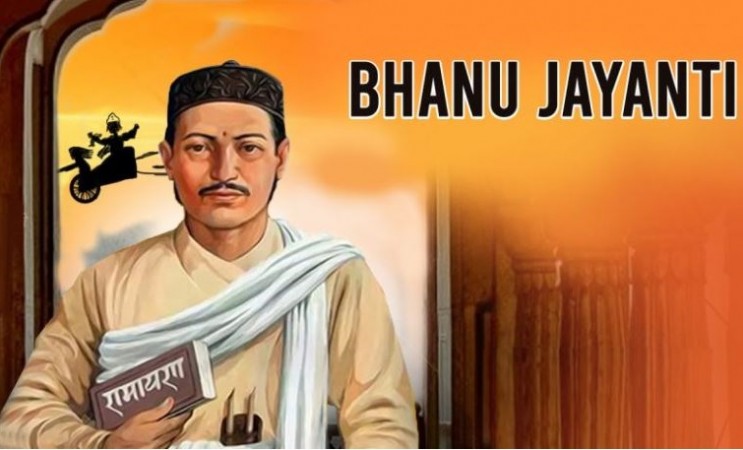
Every year on the 13th of July, the state of Sikkim in India comes alive with vibrant celebrations as it observes Bhanu Jayanti. This significant day commemorates the birth anniversary of Bhanubhakta Acharya, the renowned poet and scholar who is widely revered for his contributions to Nepali literature. Bhanu Jayanti not only pays tribute to this literary genius but also serves as a platform to promote and preserve the rich cultural heritage of the Nepali-speaking community in Sikkim.
Bhanubhakta Acharya, born on July 13, 1814, in Chundi Ramgha village in Tanahun district of Nepal, is considered the "Adikavi" or "the first poet" of Nepali literature. He was a visionary figure who played a crucial role in popularizing the Nepali language through his remarkable translations of the Hindu epic Ramayana. His adaptation of the Ramayana into Nepali language, known as "Bhanubhaktiya Ramayan," not only made the epic accessible to the common people but also instilled a sense of national pride and identity.
The celebration of Bhanu Jayanti holds immense significance in Sikkim due to its large Nepali-speaking population and its historical and cultural ties with Nepal. The event is organized by various cultural organizations, educational institutions, and government bodies in collaboration with local communities. The festivities span across the state and encompass a range of cultural programs, literary discussions, poetry recitations, competitions, and processions.
On this day, schools and colleges in Sikkim hold special functions to honor Bhanubhakta Acharya. Students actively participate in various activities, including essay writing, poetry recitals, and elocution contests, showcasing their linguistic and literary prowess. The emphasis is not only on commemorating Bhanubhakta Acharya but also on encouraging the younger generation to develop an appreciation for Nepali literature and language.
Cultural programs are organized in different parts of Sikkim, featuring traditional dances, folk songs, and dramas that depict the life and works of Bhanubhakta Acharya. These performances serve as a means of promoting and preserving the cultural heritage of the Nepali community. Artists, musicians, and performers from across the state come together to showcase their talents and entertain the audience.
Additionally, seminars and literary discussions are held where scholars, academicians, and literary enthusiasts delve deep into the works of Bhanubhakta Acharya. They analyze his contributions to Nepali literature, discuss his unique writing style, and explore the social and cultural context in which he lived. These sessions not only enhance the understanding of Bhanubhakta's literary legacy but also encourage further research and academic pursuits in the field of Nepali literature.
Bhanu Jayanti is also marked by processions and rallies that traverse through the streets of Sikkim's major towns and cities. These processions, accompanied by traditional music and dance performances, create a vibrant and festive atmosphere. People from all walks of life, clad in traditional attire, participate in these processions, carrying banners and placards with quotes and verses from Bhanubhakta Acharya's works. The lively and colorful procession not only pays homage to the literary genius but also showcases the unity and cultural diversity of the Nepali-speaking community in Sikkim.
Furthermore, the government of Sikkim takes active measures to support and promote the celebration of Bhanu Jayanti. It provides financial assistance and logistical support to cultural organizations and institutions involved in organizing the festivities. The state government also arranges for the publication and distribution of Bhanubhakta Acharya's literary works, ensuring their accessibility to a wider audience.
Bhanu Jayanti is not merely a commemoration of a poet's birth anniversary; it is a celebration of language, literature, and cultural heritage. It serves as a reminder of the profound influence of Bhanubhakta Acharya's literary contributions and his role in shaping the cultural identity of the Nepali-speaking community. The observance of Bhanu Jayanti in Sikkim continues to foster a sense of pride, unity, and appreciation for the rich literary tradition that Bhanubhakta Acharya left behind.
As the 29th day of the Nepalese month of Ashadh approaches, the state of Sikkim eagerly awaits the arrival of Bhanu Jayanti. It is a time when the spirit of Bhanubhakta Acharya's poetry and vision resonates throughout the region, inspiring generations to come and reaffirming the invaluable legacy of this literary luminary.